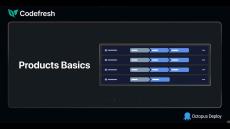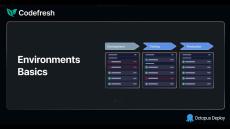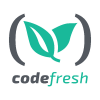|
By Pasha Kostohrys
Argo CD is a declarative, GitOps-based continuous delivery tool designed to simplify and streamline application deployments in Kubernetes environments. As part of the CNCF (Cloud Native Computing Foundation) ecosystem, Argo CD has become a cornerstone for teams embracing cloud-native development practices. At its core, Argo CD ensures that the desired application state defined in Git repositories is automatically synchronized with the live state of applications running in Kubernetes clusters.
|
By Kostis Kapelonis
We’re excited to announce the first set of official Codefresh steps for Octopus Deploy. This provides another way to streamline your processes by integrating your Codefresh builds with deployments in Octopus Deploy. In this post, we walk you through the process of creating a release and deploying it to an Octopus environment through Codefresh Pipelines.
|
By Kostis Kapelonis
Two of the most popular guides we’ve written are the GitOps promotion guide and the ApplicationSet guide. Used together, they explain an end-to-end solution for organizing your GitOps applications and promoting them between different environments, while keeping things DRY by using application sets. Both of these guides use Kustomize. We offered some hints for Helm users, but this is a dedicated guide for Helm applications.
|
By Kostis Kapelonis
One of Argo CD’s standout features is its powerful user interface (UI) that shows the live status of all applications and the respective Kubernetes resources. Both developers and operators can quickly understand the status of their deployments by looking at the UI and drilling down into all the different views of Argo CD applications. Some teams even use the Argo CD UI as a generic Kubernetes dashboard and management interface (especially after the addition of the web-based terminal feature).
|
By Luke Goodfellow
Welcome to our quick start guide, designed to help you get the most from Codefresh. Whether you want to use the CI portion to build and test your applications or explore the GitOps feature powered by Argo CD, this is the place to start. We’ll walk you through setting up runtimes for non-production and testing purposes and provide sample code to ensure you have everything you need to get started. You can use the code provided as a model if you need to deploy in a production manner.
|
By Kostis Kapelonis
Argo CD is the most popular GitOps tool for deploying applications to Kubernetes clusters. Many teams that move their applications to Kubernetes choose Argo CD for its powerful sync engine and intuitive dashboard. Argo CD is also fully open source, which means teams can freely install it on their private clouds, behind-the-firewall data centers, or even in air-gapped environments without any licensing restrictions.
|
By Pasha Kostohrys
Accidentally deleting an application is bad, but accidentally deleting all of them is a lot worse. In this post, I show you how to avoid issues like the following: Argo CD finalizers is a built-in Argo CD feature that confuses many new users and can even result in accidental deletion if you’re not careful. If you see a resource managed by Argo CD that was supposed to be deleted but isn’t, then you can almost certainly blame a finalizer.
|
By Kostis Kapelonis
Teams adopting GitOps often ask how to use secrets with Argo CD. The official Argo CD page about secrets is unopinionated by design and simply lists a set of projects that can help you with secrets. We’ve seen several approaches to secret management. These include sealed secrets, the Argo CD Vault plugin, and the External Secret Operator. In this post, we showcase the External Secret Operator and Hashicorp Vault and focus on 2 important aspects.
|
By Dan Garfield
Kubernetes at the edge has become extremely popular with retail companies like Chik-Fil-A and Starbucks, leading the way as famous examples to the more exotic US Air Force deploying Kubernetes on F-16s. At Codefresh we’ve seen and helped implement every kind of edge deployment from clusters in retail stores, mobile clusters in vehicles, air-gapped clusters for telecoms, and lots more.
|
By Kostis Kapelonis
In our big guide for Kubernetes deployments, we explained the benefits of using dynamic environments for testing. The general idea is that each developer gets a preview environment instead of having a fixed number of testing/QA environments. The environment gets created on the fly when you open a pull request. Typically, it gets destroyed when you merge the pull request (or after a specific amount of time).
|
By Codefresh
Master Argo CD with our new live show, Argo Unpacked, hosted by Dan Garfield and Revital Barletz. Suitable for everyone, from beginners to advanced users, we'll cover practical use cases, new features, and live Q&A to help you get the most out of Argo CD.
|
By Codefresh
Technology moves fast. If your current CI/CD is not up to speed, set yourself up for success and ensure your next choice supports these valuable features including: You're in Good Company This FREE Guide will help you discover the most important features any CI/CD tool should have.
|
By Codefresh
This FREE guide highlights the downside to not deploying as often as possible.
|
By Codefresh
Get the FREE ebook to see if your CICD measures up.
- February 2025 (6)
- January 2025 (8)
- December 2024 (1)
- November 2024 (5)
- October 2024 (5)
- September 2024 (1)
- August 2024 (7)
- July 2024 (2)
- June 2024 (7)
- May 2024 (4)
- April 2024 (1)
- March 2024 (3)
- February 2024 (9)
- January 2024 (2)
- December 2023 (1)
- November 2023 (1)
- October 2023 (3)
- September 2023 (4)
- August 2023 (3)
- July 2023 (4)
- June 2023 (5)
- May 2023 (3)
- April 2023 (2)
- March 2023 (4)
- February 2023 (3)
- January 2023 (5)
- December 2022 (3)
- November 2022 (2)
- October 2022 (3)
- September 2022 (2)
- August 2022 (5)
- July 2022 (5)
- June 2022 (1)
- May 2022 (2)
- April 2022 (4)
- March 2022 (11)
- February 2022 (6)
- January 2022 (2)
- December 2021 (7)
- November 2021 (1)
- October 2021 (2)
- September 2021 (7)
- August 2021 (2)
- July 2021 (8)
- June 2021 (5)
- May 2021 (5)
- April 2021 (7)
- March 2021 (7)
- February 2021 (14)
- January 2021 (15)
- December 2020 (12)
- November 2020 (19)
- October 2020 (12)
- September 2020 (2)
- August 2020 (7)
- July 2020 (8)
- June 2020 (4)
- May 2020 (6)
- April 2020 (7)
- March 2020 (8)
- February 2020 (1)
- January 2020 (5)
- December 2019 (8)
- November 2019 (5)
- October 2019 (5)
- September 2019 (3)
Codefresh has everything you need to build, integrate, and deploy your product — without the slow build times, complicated setup, and restrictions.
Each step in a Codefresh CI/CD pipeline is its own container, enabling unparalleled speed, modularity, and flexibilty. And with our built-in steps library, you can create a full-fledged pipeline in minutes. From performing a canary release in Kubernetes to building an iOS app, you can create a pipeline that does just about anything in minutes.
Run your builds in a fraction of the time:
- Built for speed and scalability: Codefresh is designed to be the fastest CI/CD platform available. It’s built on Kubernetes for fast speed and unlimited scalability. It’s time to say goodbye to slow, frustrating builds.
- Advanced Distributed Caching: Thanks to our smart docker image layer caching, an embedded registry, and a shared persistent volume, Codefresh caches images, layers, source code, dependencies, and more—and they’re distributed across all nodes used in any pipeline. Your builds are about to be faster than ever.
- Parallel steps and pipelines: Create steps that run in parallel, with powerful features that allow you to explicitly define step order, mix and match sequential and parallel steps, set up prerequisite success criteria for parallel steps, and more.
Codefresh helps you build powerful, fast, and simple CI/CD pipelines.
























